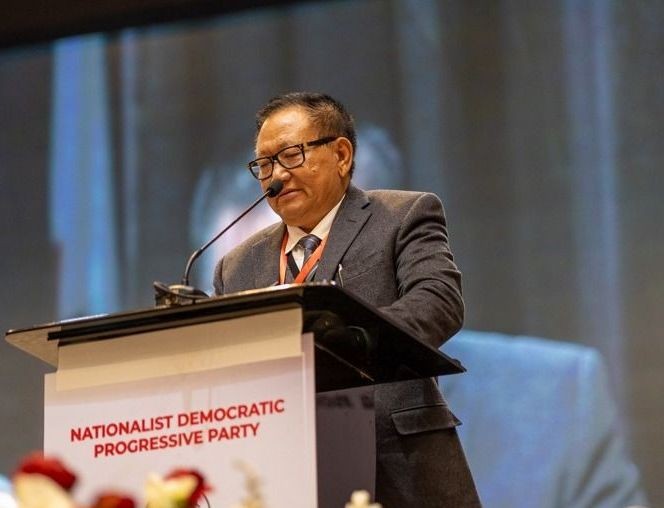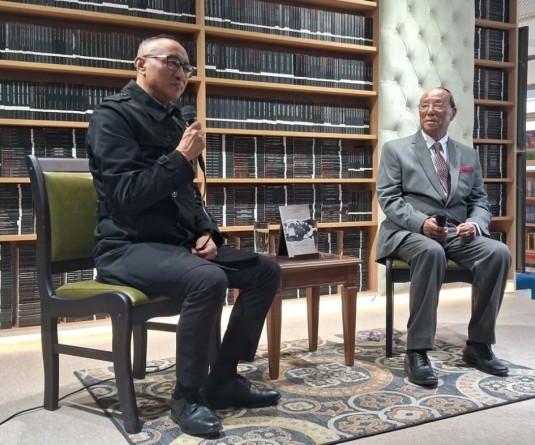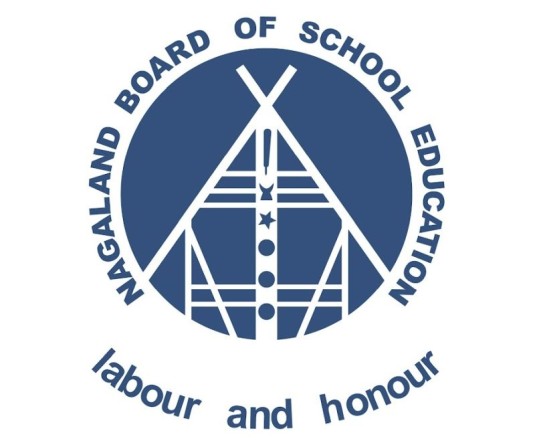TR Zeliang addressing 5th General Convention of NDPP in Kohima on February 27.

Our Correspondent
Kohima | February 27
Nagaland Deputy Chief Minister TR Zeliang today maintained that the Government's Flagship programmes and welfare schemes have been playing a pivotal role in transforming Nagaland. “They are not just addressing immediate needs but also laying the foundation for a brighter and more prosperous future,” he said addressing 5th General Convention of Nationalist Democratic Progressive Party (NDPP) at Capital Cultural Hall, Kohima.
However, he said, the journey towards inclusive development requires collective effort from the government, civil society and the people of Nagaland. Despite having various flagship programmes yet our State's per capita income stands only at 1.45 lakh approximately, he said adding “Whereas, if we compare with our Northeast state of Sikkim which has the highest per capita income at 5.87 Lakh, we stand very low. Our State should also target to double this in the next 5-6 years.”
Ever since Statehood, one major drawback to our state's economy is road connectivity, he said and maintained that Nagaland have made great strides in connectivity with construction of sustainable 4-Lane and 2-Lane Highways in the state. Yet, we still have a long way to go to connect every district with sustainable 2-lane highways, he said.
Stating that Nagaland is a landlocked state and road is the only means of transport, he stressed on the need for sustainable road to grow the state’s economy and National Highway can provide it.
Zeliang said that the State of Nagaland is traversed by 12 National Highways, covering a total length of 1578.38 KM, out of which 910 KM is entrusted to the Nagaland PWD (NH) and the rest 668.38 KM is under the supervision of NHIDCL.
Major constructions are ongoing and hopefully in a few years' time, all District Hq will be well connected by National Highways.
“One of the major factors for slow progress of National Highway Construction in the State is Land Acquisition. The State Government is making earnest effort to bring about necessary amendments to the Nagaland Land Requisition and Acquisition Act 1965 so that the land compensation matter in respect of National Highway may not hinder the progress of work,” Zeliang, the Minister In-Charge of Planning & Transformation said.
Touching on Pradhan Mantri Gram Sadak Yojana (PMGSY), a programme of the Ministry of Rural Development and Swachh Bharat Mission (SBM), he said that such Mission has brought about not only infrastructural assistance for hygienic living but also awareness on cleanliness and adopting safe and sustainable sanitation activities.
Implemented by the PHED and Urban Development Department in the State, people especially in the rural area are benefited, he said. He said that Pradan Mantri Awas Yojana (PMAY) aim at providing affordable housing to all by 2024.
Touching on Mahatma Gandhi National Rural Employment Guarantee Act (MGNREGA), he said “This is a scheme which is most common and sought after in Nagaland.” “With so much funds sanctioned by the Centre, it is important that people are benefited on the ground and not just on paper. The implementing department should also be mindful and ensure that benefits of the scheme reach the beneficiaries and the fund provided should be utilized judiciously,” he said.
In Nagaland, he said that Ayushman Bharat - Pradhan Mantri Jan Arogya Yojana (PMJAY) has been a lifeline for many, ensuring that even the poorest families have access to quality healthcare services without financial hardship. At present, there are a total of 77 empanelled hospitals within the State under PMJAY. He said that Chief Minister's Health Insurance Scheme complements the PMJAY by providing additional health coverage to the state government employees and one member of the family up to Rs 20 lakh in a year. With a total of 66 empanelled hospitals outside and 66 hospitals within Nagaland, this scheme ensures that the people get the best healthcare facilities at a very affordable price, he said.
He told the gathering that the Nagaland Health Project (NHP) with support from World Bank is another notable project which aims to improve management and delivery of health services and increase their utilization by the people in the State.
Zeliang said that the Nagaland State Rural Livelihood Mission (NSRLM) inspired by National Rural Livelihood Mission (NRLM) aims to reduce poverty by promoting self-employment and entrepreneurship among rural women and youths through various training and guidance workshops.
With employment scope in the Government Sector reaching its saturating point, the young people must now learn to explore other avenues for revenue generation and give more focus on skill development for a sustainable development of the state, Zeliang said.
He said that Tourism sector holds great potential to generate revenue and improve the economy of the State. He said that the Hornbill Festival has now gained not just national but international recognition and attracts thousands of tourists from across the globe. “Eco-tourism and adventure tourism can be further promoted to create employment opportunities and stimulate local economies,” he said.
He said that the State's remoteness and limited access to markets have also posed significant barriers to economic growth in general. “Nevertheless, with the assistance from the Central government, Schemes like
The North East Industrial Development Scheme (NEIDS) has been instrumental as it provides incentives to industries to engage with the North East region. However, there is a need for greater private sector participation and improved infrastructure to unlock Nagaland's full economic potential. In the meantime, promoting Small and medium enterprises (SMEs) and agro-based industries is important to maintain a gradual growth,” he said.
Stating that Nagaland state is heavily reliant on central government funds ‘as we have limited internal revenue generation,’ Zeliang said “There is a need to diversify the economy and explore new revenue streams to reduce this dependence and grow economically self-reliant.”
In this regard, the exploration and extraction of natural crude oil and mineral deposits viz. Iron ore, coal, limestone etc. is an important area to be tapped for the growth of state, he said. By leveraging its strengths in agriculture, tourism and handicrafts and by addressing infrastructure and skill gaps, Nagaland can achieve sustainable and inclusive development, Zeliang added.





